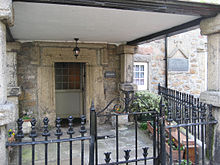John Keigwin

John Keigwin (1641–1716) was a Cornish antiquary, born at Mousehole, Cornwall.[1] He was a leading member of a group of antiquaries in west Penwith: this group also included John and Thomas Boson, William Gwavas, Thomas Tonkin, William Borlase, Oliver Pender, and James Jenkins of Alverton. His teacher was John Boson.[2] In addition to Cornish and English, Keigwin had a command of the French, Latin, Greek and Hebrew languages.
Family background
Keigwin was the son of Martin Keigwin and his second wife, Elizabeth, née Scawen. This made him the nephew of William Scawen, another scholar of the Cornish language.
Works
Keigwin undertook translations of Pascon agan Arluth and Creacon of the World.[3] These were later published by Davies Gilbert in 1826 and 1827 respectively.[4]
He also translated into Cornish King Charles I's letter to the people of Cornwall, written at Sudeley Castle in 1643.
Criticism
The scholars Edward Lhuyd and William Borlase described Keigwin's knowledge of the Cornish language as "profound and complete", but later commentators have been more critical.
Henry Jenner noted "extraordinary mistakes" in Keigwin's translations of Pascon and Creacon.[2] Elsewhere, Jenner and Peter Berresford Ellis observed that, in his translation of King Charles's letter, Keigwin used the Hebrew word for war, milchamath, instead of bresel.[5]
Robert Morton Nance regarded Keigwin's Cornish as poor. However, E. G. Retallack Hooper maintained that criticism resulted in part from the way Davies Gilbert had edited his writings: Gilbert did not understand any Cornish himself, and was unable to read Keigwin's handwriting properly.
Although Keigwin's reputation in Cornwall was good, his work was neglected until it was reexamined by Whitley Stokes and others.[6]
Legacy
John Boson wrote Keigwin's epitaph in 1716, given here in a later orthography:
En Tavaz Greka, Lathen ha’n Hebra,
En Frenkock ha Carnoack deskes dha,
Gen ol an Gormola Brez ve dotha
Garres ew ni, ha Neidges Ewartha.[7]
Or in English: "In tongue Greek, Latin and Hebrew / In French and Cornish, learned well / With all the Glory of Mind was to him / Has left us, and fled is he on high."[8]
Keigwin's manuscripts are divided between the British Library, the Bodleian Library and the National Library of Wales. They include a transcription of the Ordinalia written about 1707, which is accompanied by an English translation and a Latin preface.[9]
Footnotes
- ^ George Clement Boase (1892). "Keigwin, John". In Dictionary of National Biography. 30. London. p. 308.
- ^ a b Henry Jenner (1904). Handbook of the Cornish Language.
- ^ D. Simon Evans (Autumn 1969). "The Story of Cornish". Studies: An Irish Quarterly Review. 58 (231): 293–308. JSTOR 30087876. Retrieved 12 August 2021.
- ^ Keigwin, John (1826). Gilbert, Davies (ed.). Mount Calvary, or, The History of the Passion, Death, and Resurrection, of our Lord and Saviour Jesus Christ; Written in Cornish (as it may be conjectured) some centuries past; interpreted in the English tongue, in the year 1682, by John Keigwin. London: J. B. Nichols. Keigwin, John (1827). Gilbert, Davies (ed.). The Creation of the World, with Noah's flood; written in Cornish in the year 1611, by William Jordan; with an English translation by John Keigwin. London: J. B. Nichols.
- ^ Peter Berresford Ellis (1974). The Cornish Language and its Literature. London: Routledge. ISBN 978-0-710-07928-2; p. 92 Google Books
- ^ Ellis (1974); p. 91; citing Old Cornwall; vol. 3, nos. 4 &5 and A. S. D. Smith The Story of the Cornish Language; revised by E. G. Retallack Hooper. Camborne, 1969
- ^ John Boson (1715). Verse in honour of John Keigwin www.moderncornish.co.uk Archived 2008-09-07 at the Wayback Machine
- ^ Ellis (1974); p. 111
- ^ Ellis (1974); p. 91 & fn
